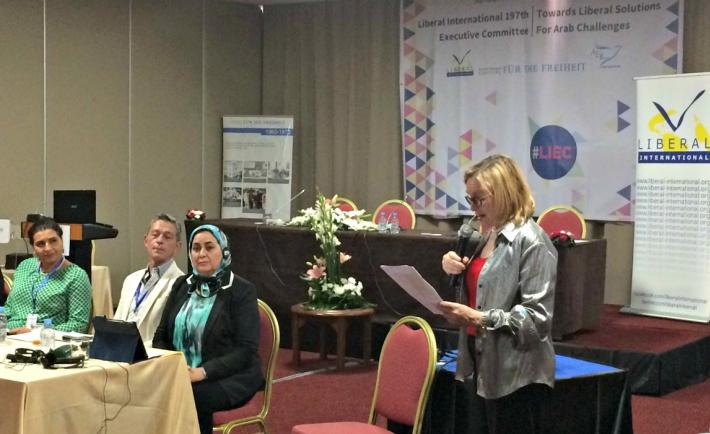
NDI and Liberal International's (LI) session "Ending Violence Against Women in Politics: Liberal Strategies and Perspectives," which was held during the 197th LI Executive Committee meeting on November 12, 2016, in Marrakesh, Morocco
When I look at my political career, I realize how much we owe to the struggles of my mother and grandmother’s generations. By the time my grandmother became an adult, she was able to vote on equal terms with men because that universal right had been introduced in 1906, making Finnish women the first in the world legally allowed to run for office. Those rights came about largely because men and women, young and old, farmers, workers, entrepreneurs, everybody was needed in the struggle for independence, which we achieved in 1917.
Even as women around the world continue to make tremendous strides in every field of human endeavor, in OECD countries and emerging economies alike, women who want to participate politically are threatened with violence. Young women parliamentarians, like Jo Cox in England, have been shot dead while doing the job they were elected to do. Why is this? For me, the answer is about power and inequality. It is about people not understanding that democracy requires everybody’s opinion. Everybody’s contribution is equally important. Those of us who believe in democracy know that access to education and the political participation of girls and women are the best ways to develop a prosperous society. Yet, even in Finland, which has had a female president and two female prime ministers, the proportion of women elected to Parliament is not rising, and attitudes against women in political leadership seem to be hardening.
The backlash against women in politics is also being played out on social media, where hate speech is directed at female journalists, researchers and politicians. Hate speech that targets women is different than that which targets men: it is more violent in tone and/or makes explicitly sexual references. Its aim is to frighten women into silencing their own voices in society. During my time as Finland’s Minister of Migration and European Affairs, I experienced this kind of attack. Someone created a Facebook group inciting people to commit violence against me, and the threats and harassment poured in. Compared to others I was lucky; the authorities could trace who had set up the group, and because it was done on a server in Finland, the Finnish prosecution could take action and the perpetrator was sentenced.
This was not my only experience of hatred of this kind, and I was often asked whether I feared for my life. I will not answer the question and give anyone the sick satisfaction of thinking they even made me consider the issue. What I know is that nobody should live in fear to exercise their legitimate human and political rights, and the authorities need to take these types of threats seriously. That was why I went to the police: because I wanted to show that negative behaviors of this kind are not acceptable and that law enforcement can be effective against such perpetrators.
That is also why I am so happy to write about the collaboration between Liberal International (LI) and the National Democratic Institute (NDI) on the issue of stopping violence against politically active women. Both NDI’s #NottheCost campaign and LI’s campaign for the adoption of the Council of Europe’s Istanbul Convention, have the same goal and are mutually reinforcing. As an association of liberal parties around the world, LI has a key leadership role to play in setting standards for our member parties, and NDI has already proven itself to be a leader on the issue of preventing violence against women in politics, elections, political parties and online.
LI supports the principles of the Council of Europe’s Istanbul Convention, but - as non-European countries can adhere to the Convention as well - also calls on our member parties to work towards the signing and ratification of the Convention in their national jurisdictions. Another good example of LI’s leadership on the issue of violence against politically active women is the adoption of the Nairobi Declaration on Prevention and Elimination of Violence against Women by the Africa Liberal Network earlier this year. The Nairobi Declaration states that:
- Violence against women is an impediment to their full and equal participation in politics;
- Parties have to get their own house in order on the issue; and,
- All political institutions have to take action to end all violence against women.
With these three giant steps forward, the Nairobi Declaration now serves as a guiding roadmap on the issue for the entire LI membership.
NDI and LI started the #NotTheCost and Istanbul Convention campaigns long before the recent #MeToo response to sexual harassment scandals in the United States. However, they all target the same unacceptable attitude towards women, often intended to diminish and silence them. We have to fight against this attitude when it manifests in the political arena, because it drives women away from politics. Societies continue to be poorer - both economically and in terms of political development - than they would be if the full range of diverse perspectives were allowed to participate.
I am proud to be a member of a global network of party activists committed to leading the fight against the sort of violence that threatens politically active women. While she would be surprised that we are still having to have this fight, my grandmother would be proud too.
